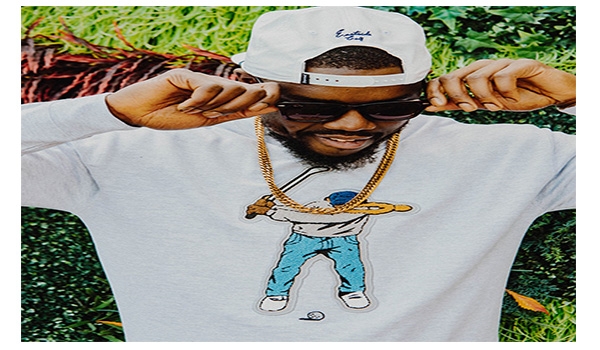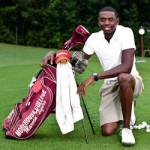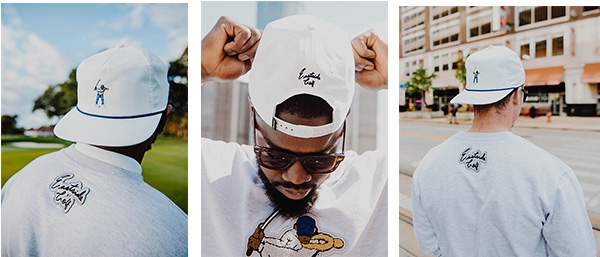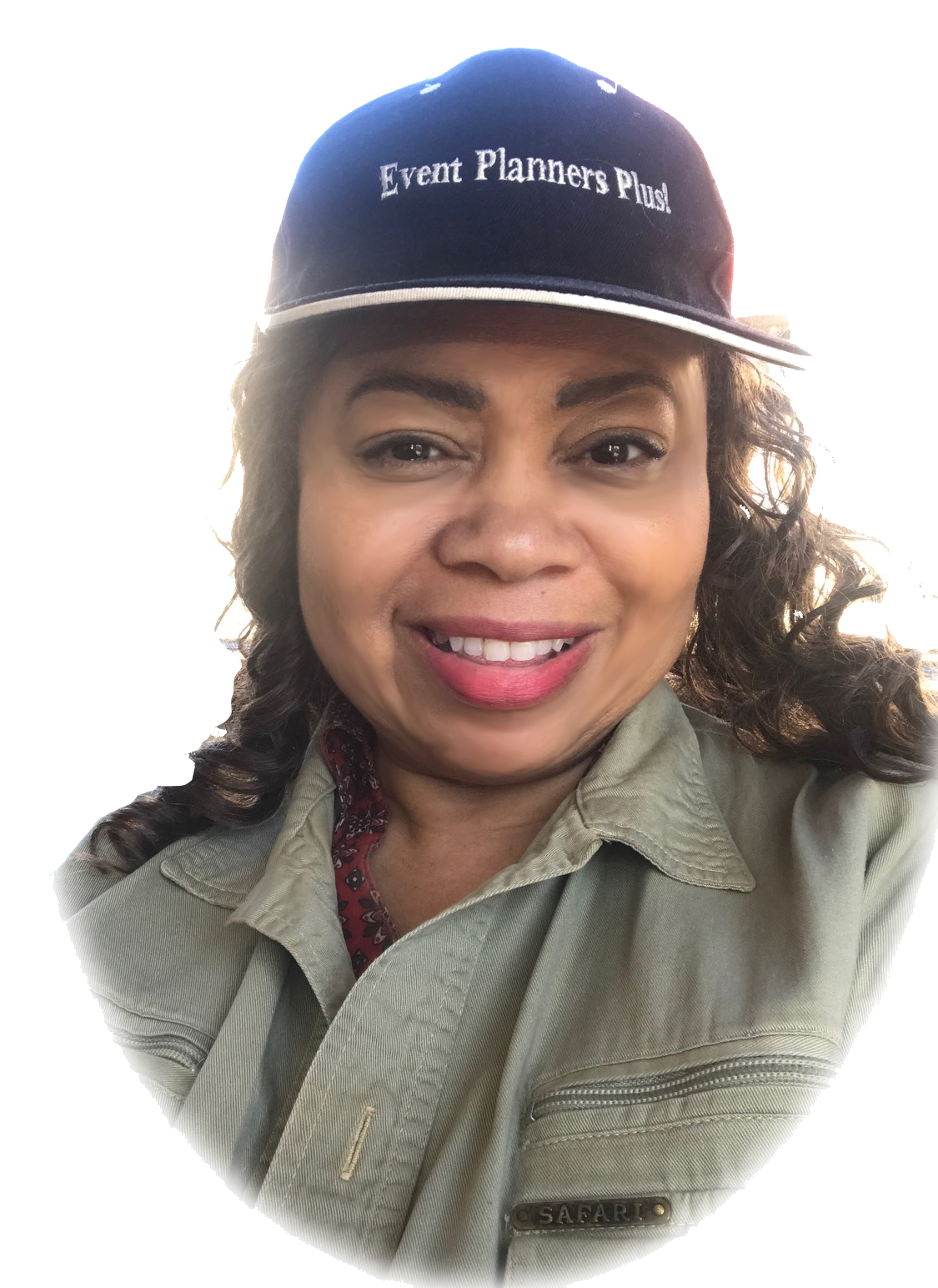By LJ Finney
(December 10, 2019)— On the street in Detroit, Michigan, a stranger stopped Olajuwon Ajanaku, who was wearing his “Eastside Golf” sweatshirt and said, “Bro, I saw that on the internet, is that the new Black Ralph Lauren?”
The fashions of basketball, football, and hockey transcend the arenas in which these sports are played. People—regardless of gender—wear sports jerseys. It is, however, strongly unlikely that the average person is familiar with golf fashion brands, or the faces that represent those campaigns. At best, golf fashion-wear quietly invades offices, where business casual attire usually translates into polo shirts and khaki pants. It is a uniform that transfers well from the office to the golf course and vice versa. Nothing about this look is fashionable or cool, it is business casual and represents a subset of golfers.
Enter Eastside Golf, a “stylish brand made to build awareness to the youth and non-golfers how cool golf is. The new age of golf is here,” says 30-year-old entrepreneur and brand owner Olajuwon. BusinessDictionary.com defines branding as “The process involved in creating a unique name and image for a product in the consumers’ mind, mainly through advertising campaigns with a consistent theme. Branding aims to establish a significant and differentiated presence in the market that attracts and retains loyal customers.” Designed to influence the look of golf, Eastside Golf engages consumers with the powerful symbolism of the logo. Eastside Golf’s Business Development and Brand Ambassador Earl Cooper, PGA has a keen eye and keeps the line fresh. What is immediately noticeable about the graphic is a black man, with a golf club, at the top of his backswing, wearing what reminds us of an old school gold Cuban links chain.
The story of Eastside Golf is not a familiar one. Olajuwon Ajanaku, whose Nigerian name translates to mean “born to be a king,” aspires to be a professional golfer, yet, he decided to take an office job because of a lack of sponsorship funding needed to play on the Tour. African American Golfer’s Digest first profiled Olajuwon in 2012, shortly after he graduated from Morehouse College in Atlanta, Georgia.
As an aspiring professional golfer with a zero handicap, he was competing aggressively and winning. In this game, passion and prowess only advances a golfer but so far. For those that are not familiar, golfers need high dollar, corporate level, sponsorships to cover the expenses associated with entry into golf competitions and travel accommodations. The expenses are in addition to the cost of practice, equipment, coaches, and to participate in multiple tournaments to qualify for the larger events.
“As far as finding sponsors, and them giving me enough money to sustain myself and compete, it’s tough,” confessed Olajuwon. Every win results in “a purse,” which is the award money but without sponsors, players cannot make it to the qualifying competitions.
 YOU MAY ALSO LIKE: Golfer Profile Olajuwon Ajanaku
YOU MAY ALSO LIKE: Golfer Profile Olajuwon Ajanaku
In the November 2019 article “We Are Not Golf, Yet,” James R. Beatty, executive editor at the African American Golfer’s Digest shared an in-depth research report and his perspective on the state of diversity in the golf industry. “Competitive Play: From a sample size of slightly more than 30,000 competitive golfers, showed 1.5% are African American.” A large obstacle to seeing professional golfers of color is access to capital and equitable corporate support, beyond caddie scholarship programs. Golfers learn to play and compete, and some golfers learn to manage the business funding of their own golf careers, but where is the corporate sponsorship? Unlike basketball and football, there isn’t a “draft day” with a professional team to recruit players. Golfers are mainly on their own.
Olajuwon is currently a resident of Detroit, Michigan, employed at a prestigious bank as a regional sales manager, and still an avid golfer. When asked about going pro, Olajuwon shared, “It’s not out the window but it fell by the wayside.” The story of Eastside Golf is the story of Olajuwon Ajanaku, and how he used ingenuity and his fashion sense to create a recognizable brand that resonated within his community. He asked himself, “How can I affect the world and change how people see golf, and make it cool, and make it something everyone wants to play by seeing the logo?”
Take his line’s White Eastside Vintage Rope Hat. It’s made of quality Performance poly fabric, has a 5 panel ‘retro fit’ with stand-up mesh stay, woven rope along the base of its front panel and an adjustable plastic snap closure—It screams cool! The logo was designed to initially to attract sponsors, it instead became the start of a movement.
Growing up on the Eastside of Atlanta, golf was not common for men of color. A family friend introduced Olajuwon to golf when he was six years old and he cultivated his skills at the local courses like John A. White Golf Course, East Lake’s Charlie Yates Academy, and Sugar Creek Golf Course. Although he excelled at other sports like basketball, Olajuwon preferred the mental aspect of golf. “Nobody really saw my vision and nobody saw how cool golf actually was and what it does for your life. I would say golf raised me to a certain degree.”
During his time at Morehouse College, competitive golf aided his professional development and the true test of his character. However, the vestiges of racism and discrimination hide in the crevices of society, even on the golf course. Golf gave him tools to navigate and rise above complex situations and those lessons would prepare him for corporate America. “You get to stand there and you get to talk to some educated people for four or five hours on the golf course and it changes your perception, a lot.”
The Eastside Golf brand was launched in November 2019 to transform the perception of golf. Perhaps it is what Stephen Curry set out to do with Under Armor. Use his brand, as a superior athlete, to make golf represent him because it is a sport that he loves. Entrepreneurs can differentiate themselves in oversaturated markets through effective branding. It is the action of uniting your company voice with the hearts and minds of the consumer. Olajuwon Ajanaku is passionate about golf and growing the game in the black community. “I want to do something that I enjoy and fulfills me. I’ve got to brand myself, come up with a logo that represents me. You can look however you want to look with jeans, sweatshirt, and some sneakers, and you could be playing golf, that’s the message,” he says. Through his presence in volunteering for The First Tee, children in Detroit see themselves in golf.
Eastside Golf represents the future face of golf and a lifestyle. “What has actually worked to get more minorities, more people of color into the game of golf?” If throwback jerseys, tracksuits with three lines, sneakers with the number 23, and a fuzzy bear on knit-sweaters can make a fashion statement in the black community, we are ready for this brand. We are ready for the impact that representation has on the next generation of golfers.
“You don’t have to play golf to wear my brand, this could be worn to the club if you want. It’s sending a message, golf is cool.” At a party in NYC, in a crowd of music industry professionals, a man named Henry wore a grey sweatshirt and denim jeans. Although this attire is the NY athleisure uniform, he stood out. The stylish black golfer with Cuban Links, from the Eastside of Atlanta, had arrived.






